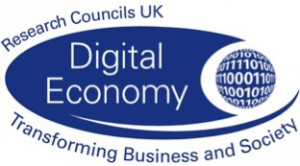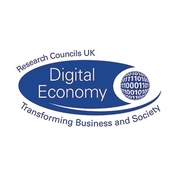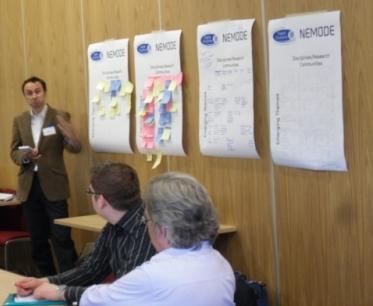Here’s some more information…
Which means…?
We’re seeking to come up with novel research which addresses one of the ‘grand challenges’ – how do we realise the transformational impact of digital technologies on aspects of community life, cultural experiences, future society and the economy?
So, who should attend?
The sandpit is open to everyone, and we do mean all BU staff and PhD students. You don’t need a track record in digital research, though we’d like yo u to consider attending if you do have. It doesn’t matter whether you have a research track record or not. We want anyone who thinks they might have something to contribute (and even those who think they don’t), and who is available all day on 26 January and during the morning of 27 January to come along.
u to consider attending if you do have. It doesn’t matter whether you have a research track record or not. We want anyone who thinks they might have something to contribute (and even those who think they don’t), and who is available all day on 26 January and during the morning of 27 January to come along.
What do I need to prepare in advance? What will the sandpit entail?
Absolutely nothing in advance. During the sandpit, you’ll be guided through a process which results in the development of research ideas. The process facilitates creativity, leading to innovative and interdisciplinary research ideas. These ideas will be explored with other attendees, and further developed based on the feedback received.
What if I don’t have time to think about ideas in advance?
You don’t need to. Some inspiring speakers with a range of backgrounds will be coming along to give you ideas…
What about afterwards? Do I need to go away and do loads of work?
Well… that depends! Tthe sandpit will result in some novel research ideas. Some of these may be progressed immediately, others might need more time to think about. You may find common ground with other attendees which you choose to take forward in other ways, such as writing a paper.
What if my topic area is really specific, such as health?
Your contribution will be very welcome! One of the main benefits of a sandpit event such as this, is to bring in individuals with a range of backgrounds and specialisms who are able to see things just that bit differently to one another.
So, is this just networking?
Definitely not, it is a facilitated session with the primary intention of developing innovative research ideas, which also enables the development of networks. It gives you the opportunity to come up with research ideas which you may develop over time, together with the chance to find common ground with academics from across BU.
So, how do I book onto this event?
To take part in this exciting opportunity, BU academic staff and PhD students should complete the Sandpit Application Form and return this to Dianne Goodman by Tuesday 12th of January – please note the deadline has been extended due to the festive break. Places are strictly limited.
By applying, you agree to attend for the full duration of the event – full day 26th January and half day 27th January.
This event is part of BU’s Interdisciplinary Research Week.
 The EPSRC are offering three prizes of £10,000 for RCUK Digital Economy (DE) grantholders to help capture and promote the impact the Digital Economy grant is having. Applicants will need to explain how they will use the prize to engage the public with their research and demonstrate what the benefits of the research have been. Applications must be received no later than 12:00 noon on Wednesday 06 December 2017.
The EPSRC are offering three prizes of £10,000 for RCUK Digital Economy (DE) grantholders to help capture and promote the impact the Digital Economy grant is having. Applicants will need to explain how they will use the prize to engage the public with their research and demonstrate what the benefits of the research have been. Applications must be received no later than 12:00 noon on Wednesday 06 December 2017.
 u to consider attending if you do have. It doesn’t matter whether you have a research track record or not. We want anyone who thinks they might have something to contribute (and even those who think they don’t), and who is available all day on 26 January and during the morning of 27 January to come along.
u to consider attending if you do have. It doesn’t matter whether you have a research track record or not. We want anyone who thinks they might have something to contribute (and even those who think they don’t), and who is available all day on 26 January and during the morning of 27 January to come along.


 The RCUK Digital Economy Theme (DET) is running a competition designed to help capture and promote the impact that your digital economy research is having. Three prizes of £10,000 are available to support researchers to further tell the story of your research impact in an interesting and engaging way to a wider audience. Closing date is 10th October.
The RCUK Digital Economy Theme (DET) is running a competition designed to help capture and promote the impact that your digital economy research is having. Three prizes of £10,000 are available to support researchers to further tell the story of your research impact in an interesting and engaging way to a wider audience. Closing date is 10th October. 

 Academics from multi-disciplinary backgrounds recently attended a two day Digital Economy Network+ event at the University of Cambridge. The aim of the event was to continue the process of building a network of people interested researching New Economic Models for the Digital Economy.
Academics from multi-disciplinary backgrounds recently attended a two day Digital Economy Network+ event at the University of Cambridge. The aim of the event was to continue the process of building a network of people interested researching New Economic Models for the Digital Economy.












 BU attendance at third annual GCPHR meeting in June
BU attendance at third annual GCPHR meeting in June Interactive Tangible and Intangible Heritage Applications – BU student work featured in new book chapter
Interactive Tangible and Intangible Heritage Applications – BU student work featured in new book chapter Second NIHR MIHERC meeting in Bournemouth this week
Second NIHR MIHERC meeting in Bournemouth this week MSCA Postdoctoral Fellowships 2025 Call
MSCA Postdoctoral Fellowships 2025 Call ERC Advanced Grant 2025 Webinar
ERC Advanced Grant 2025 Webinar Horizon Europe Work Programme 2025 Published
Horizon Europe Work Programme 2025 Published Horizon Europe 2025 Work Programme pre-Published
Horizon Europe 2025 Work Programme pre-Published Update on UKRO services
Update on UKRO services European research project exploring use of ‘virtual twins’ to better manage metabolic associated fatty liver disease
European research project exploring use of ‘virtual twins’ to better manage metabolic associated fatty liver disease